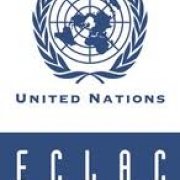 On Friday May 17th, 2013, from 10:30 am until noon (Washington D.C. time) the IV edition of the Inter-American Social Protection Dialogues Webinar Series, titled “Social protection systems in Latin America and the Caribbean: the challenge of inclusion”, will be held. This event, which will be conducted in Spanish, aims to encourage dialogue on the progress and challenges of social protection in the region and to present recent analytic work conducted by ECLAC on this topic, such as the book on Inclusive Social Protection in Latin America: A Comprehensive, Right-based Approach and the series of national case studies on Social protection systems in Latin America and the Caribbean.
On Friday May 17th, 2013, from 10:30 am until noon (Washington D.C. time) the IV edition of the Inter-American Social Protection Dialogues Webinar Series, titled “Social protection systems in Latin America and the Caribbean: the challenge of inclusion”, will be held. This event, which will be conducted in Spanish, aims to encourage dialogue on the progress and challenges of social protection in the region and to present recent analytic work conducted by ECLAC on this topic, such as the book on Inclusive Social Protection in Latin America: A Comprehensive, Right-based Approach and the series of national case studies on Social protection systems in Latin America and the Caribbean.
Social Protection in Latin America and the Caribbean
In Latin America and the Caribbean, a consensus is building on the necessity to create more inclusive social protection systems that respond to a rights-based approach, are funded on a solidarity basis funding, and have universal coverage. Several countries have made progress in this sense, but the challenges are still great and vary in function of the socio-economic and political conditions of each nation.
The United Nations Commission for Social Development (CSocD)1 defines social protection as “a set of public and private policies and programmes undertaken by societies in response to various contingencies in order to offset the absence or substantial reduction of income from work; provide assistance for families with children; and provide people with health care and housing” (United Nations, 2000). According to the Commission, these measures address both the protection and advocacy needs of the poor and extremely poor and the insurance needs of those who are not poor but need safeguards against adverse circumstances at certain stage in their lives.
The conception of social protection proposed in this webinar –based explicitly on economic, social and cultural rights− is even broader and more proactive: it includes individuals and families in all stages of life, and considers one of its main functions to promote decent work. This makes social protection responsible for ensuring access not only to health and housing, but also to education and other social services. In particular, social protection is seen a fundamental mechanism for contributing to the full realization of the economic and social rights of the population: to social security, labor, the protection of adequate standards of living for individuals and families, as well as the enjoyment of greater physical and mental health and education.
The responsibility of guaranteeing such rights lies primarily with the State, which has to play a leading role in social protection —for it to be seen as a right and not a privilege—, in collaboration with three other major stakeholders: families, the market and social and community organizations. Albeit with some differences due to their history and degree of economic development, many Latin American and Caribbean countries are now at the forefront of developing countries’ efforts to establish these guarantees, by implementing various types of transfers, including conditional cash transfer programmes and social pensions, and expanding health protection. One of the key challenges that the countries of the region face, however, is integrating the various initiatives within social protection systems capable of coordinating the different programmes and State institutions responsible for designing, financing, implementing, regulating, monitoring and evaluating programmes, with a view to achieving positive impacts on living conditions.
Social protection is central to social policy but is distinctive in terms of the social problems it addresses. Consequently, it does not cover all the areas of social policy, but rather it is one of its components, together with sectoral policies —such as health, education or housing— and social promotion policies —such as training, labour intermediation, promotion of production, financing and technical assistance to micro— and small enterprises. While sectoral policies are concerned with the delivery of social services aimed at enhancing human development and promotion policies with capacity building for the improvement of people’s autonomous income generation, social protection aims to provide a basic level of economic and social welfare to all members of society. In particular, social protection should ensure a level of welfare sufficient to maintain a minimum quality of life for people’s development, facilitate access to social services, and secure decent work.
Some of the lead questions for this event are:
1. What do we mean by social protection?
2. What is the relationship between social protection and social policy as a whole?
3. How to advance, beyond the rhetoric, toward a right-based approach to social protection?
4. Which are the more distinguished examples of social protection in the region?
5. How to manage the tension between rights and resources?
6. How can countries progress in the articulation of the non-contributory (“social assistance”) and contributory (“social security”) social protection measures?
7. Which are the administrative and management difficulties that exist, within different social protection organisations?
8. Which are good practices in this sense?
1. The CSocD is a functional commission of the United Nations Economic and Social Council (ECOSOC), which elects the 46 members that compose it.
